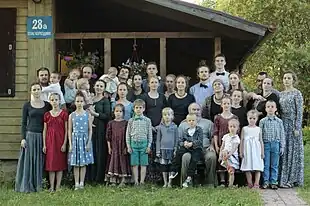< Reconstruction:Proto-Slavic

Reconstruction:Proto-Slavic/sěmьja
Proto-Slavic

*sěmьjà
Etymology
From *sě̑mь (“household member”) + *-ьjà (“collective”). Cognates include Lithuanian šeimà (“family”), Latvian sàime (“members of a household, (extended) family”), Old Prussian seimīns (“members of a household, family and servants”).
Inflection
Declension of *sěmьjà (soft a-stem, accent paradigm c)
| singular | dual | plural | |
|---|---|---|---|
| nominative | *sěmьjà | *sě̑mьji | *sě̑mьję̇ |
| genitive | *sěmьję̇́ | *sěmьjù | *sěmь̀jь |
| dative | *sěmьjì | *sěmьjàma | *sěmьjàmъ |
| accusative | *sě̑mьjǫ | *sě̑mьji | *sě̑mьję̇ |
| instrumental | *sěmьjejǫ́ | *sěmьjàma | *sěmьjàmi |
| locative | *sě̑mьjī | *sěmьjù | *sěmьjàsъ, *sěmьjàxъ* |
| vocative | *sěmьje | *sě̑mьji | *sě̑mьję̇ |
* -asъ is the expected Balto-Slavic form but is found only in some Old Czech documents; -axъ is found everywhere else and is formed by analogy with other locative plurals in -xъ.
Related terms
- *sěminъ
Derived terms
- *sěmьjьstvo
- *sěmьjьnъ
- *sěmьjьskъ
Descendants
See also
Proto-Slavic family terms
| *sěmьja, *rodina (“family”) | Male | Female |
|---|---|---|
| parent | *otъ, *otьcь (“father”) nursery: *tata |
*mati (“mother”) nursery: *mama |
| sibling | *bratrъ (“brother”) | *sestra (“sister”) |
| child | *synъ (“son”) | *dъťi (“daughter”) |
| grandparent | – (“grandfather”) nursery: *dědъ; *nana |
*ova (“grandmother”) nursery: *baba; *nena |
| grandchild | *vъnukъ (“grandson”) | *vъnuka (“granddaughter”) |
| stepparent | *otьčimъ (“stepfather”) | *maťexa (“stepmother”) |
| stepchild | *pastorъkъ (“stepson”) | *pastorъka (“stepdaughter”) |
| father's sibling | *strъjь (“paternal uncle”) nursery: *dada; *lola |
– (“paternal aunt”) nursery: *teta; *lelja |
| mother's sibling | *ujь (“maternal uncle”) nursery: *dada; *lola |
– (“maternal aunt”) nursery: *teta; *lelja |
| sibling's child | *netьjь (“nephew”) | *nestera (“niece”) |
| spouse | *mǫžь (“husband”) | *žena (“wife”) |
| parent of wife | *tьstь (“father-in-law (wife's father)”) | *tьšča (“mother-in-law (wife's mother)”) |
| parent of husband | *svekrъ (“father-in-law (husband's father)”) | *svekry (“mother-in-law (husband's father)”) |
| sibling of wife | *šurь (“brother-in-law (wife's brother)”) | *svěstь, *svьstь (“sister-in-law (wife's sister)”) |
| sibling of husband | *děverь (“brother-in-law (husband's brother)”) | *zъly (“sister-in-law (husband's sister)”) |
| spouse of child | *zętь (“son-in-law (daughter's husband)”) | *snъxa (“daughter-in-law (son's wife)”) |
| spouse of husband's brother | – | *ętry (“sister-in-law (husband's brother's wife)”) |
References
- Derksen, Rick (2008) “sěmьja”, in Etymological Dictionary of the Slavic Inherited Lexicon (Leiden Indo-European Etymological Dictionary Series; 4), Leiden, Boston: Brill, →ISBN, →ISSN, page 441
- Zaliznjak, Andrej A. (2014) “Drevnerusskoje udarenije. Obščije svedenija i slovarʹ”, in Languages of Slavic Culture (in Russian), Moscow: Institute for Slavic Studies of the Russian Academy of Sciences, page 602: “сѣмья́ — c... ― sěmʹjá — c...”
Further reading
- Šanskij, N. M. (2004) “семья”, in Školʹnyj etimologičeskij slovarʹ russkovo jazyka [School Etymological Dictionary of the Russian Language] (in Russian), Moscow: Drofa
- Chernykh, P. Ja. (1993) “семья”, in Историко-этимологический словарь русского языка [Historical-Etymological Dictionary of the Russian Language] (in Russian), 3rd edition, volumes 2 (панцирь – ящур), Moscow: Russian Lang., →ISBN, page 154
- Vasmer, Max (1964–1973) “семья́”, in Oleg Trubachyov, transl., Этимологический словарь русского языка [Etymological Dictionary of the Russian Language] (in Russian), Moscow: Progress
This article is issued from Wiktionary. The text is licensed under Creative Commons - Attribution - Sharealike. Additional terms may apply for the media files.